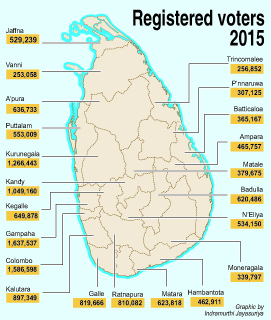News
Main political parties on campaign mode, as polls hover on the horizon
View(s):With speculation rife about early parliamentary elections, probably in end June, the main political parties are gearing up once again for the battle which they last fought five years ago.
While the United National Party (UNP), this time from a position of strength and having the incumbency advantage, is seeking to reorganise its grassroots campaign, the Sri Lanka Freedom Party (SLFP) – with one foot in the government and the other in the opposition — is pushing for electoral reforms ahead of any election. The Janatha Vimukthi Peramuna (JVP), regarded as the third force, in the meantime, is on a drive to attract educated people.
UNP General Secretary and Minister Kabir Hashim said the party’s strategy would be to build on reorganising and revitalising grassroot level membership.
“Our focus is on winning the elections and for that we have to strengthen grassroots organisers. During the past five to ten years, our supporters were threatened and their Samurdhi benefits withdrawn. We as a party need to give them hope and moral support. We are training our grassroots organisers,” he said, outlining the pre-campaign measures.
Mr. Hashim said reaching out to people in areas where the UNP gained low votes at the last elections would be a priority.
“There are many forces trying to sabotage the present government and mislead voters. At present we are conducting a house-to-house campaign and an awareness programme,” he said, adding that the party had decided not to give nominations to those who face criminal charges.
An SLFP spokesman said that while grassroots level meetings were being organised, the party was awaiting the finalisation of the electoral reforms.
“The SLFP-led UPFA got a lot of public support at the last election. While our organisers are working in village and urban areas, the party is waiting for the promised electoral reforms to decide how the party will face future elections,” he said.
Meanwhile, the JVP says it is determined to continue its campaign for good governance with the aim of increasing its strength in Parliament.
The party’s General Secretary, Tilvin Silva, said the part would campaign on the platform of more democracy and good governance in keeping with the people’s wishes as reflected in the January 8 election verdict.
“The present Government has failed to fulfil the promises made to the public. It is struggling to implement the 19th Amendment. The JVP’s voice should be stronger in the next Parliament. To strengthen democracy, there is a need to increase the percentage of JVP membership in parliament,” he said.
Mr. Silva said the party had already selected team leaders and meetings were taking place at village level.
“We are inviting educated people to enter politics and support our party. We are appealing to people who believe in our policy and want to genuinely achieve good governance and democracy,” he said.
| PAFFREL urges parties to assess candidates applying for election to Parliament An election monitoring group is pressing political parties to introduce a score card system to evaluate candidates who will apply to contest the upcoming Parliamentary elections. The People’s Action for Free and Fair Elections (PAFFREL) said it has urged all parties to apply the criteria sent to them by PAFFREL when selecting candidates for the upcoming Parliamentary election. PAFFREL Executive Director Rohana Hettiarachchi told the Sunday Times that nearly 80 percent of the political parties have accepted the set of criteria sent to them. “We want the public to engage with their representatives who will represent them in Parliament. That’s how we can create awareness among the masses when selecting an effective representative,” he said. Mr. Hettiarachchi said that the present Government is on the way to formulate a new electoral system which will benefit the country, but what is lacking is the political will to achieve those goals. Meanwhile Keerthi Tennakoon, Executive Director of the Campaign for Free and Fair Elections (CaFFE) commenting on the proposed electoral reforms said it was a good opportunity to change the political culture of the country. He said particularly eliminating the preferential voting system which has created intra-party and inter-party friction during past decades was possible through these amendments. “This is the top priority right now and all the political parties should act on that,” he said. He pointed out that there was no rush to dissolve this Parliament without passing the necessary amendments since a people’s mandate was given until April 2016. “We understand that going for electoral reforms and constitutional amendments is a political decision but the people should be entitled to know what their representatives are doing in Parliament, It does not matter now whether the next Parliamentary election is going to be conducted under the existing electoral system or the new system but we have to make sure the new electoral system is approved by the present Parliament,” he said. |

